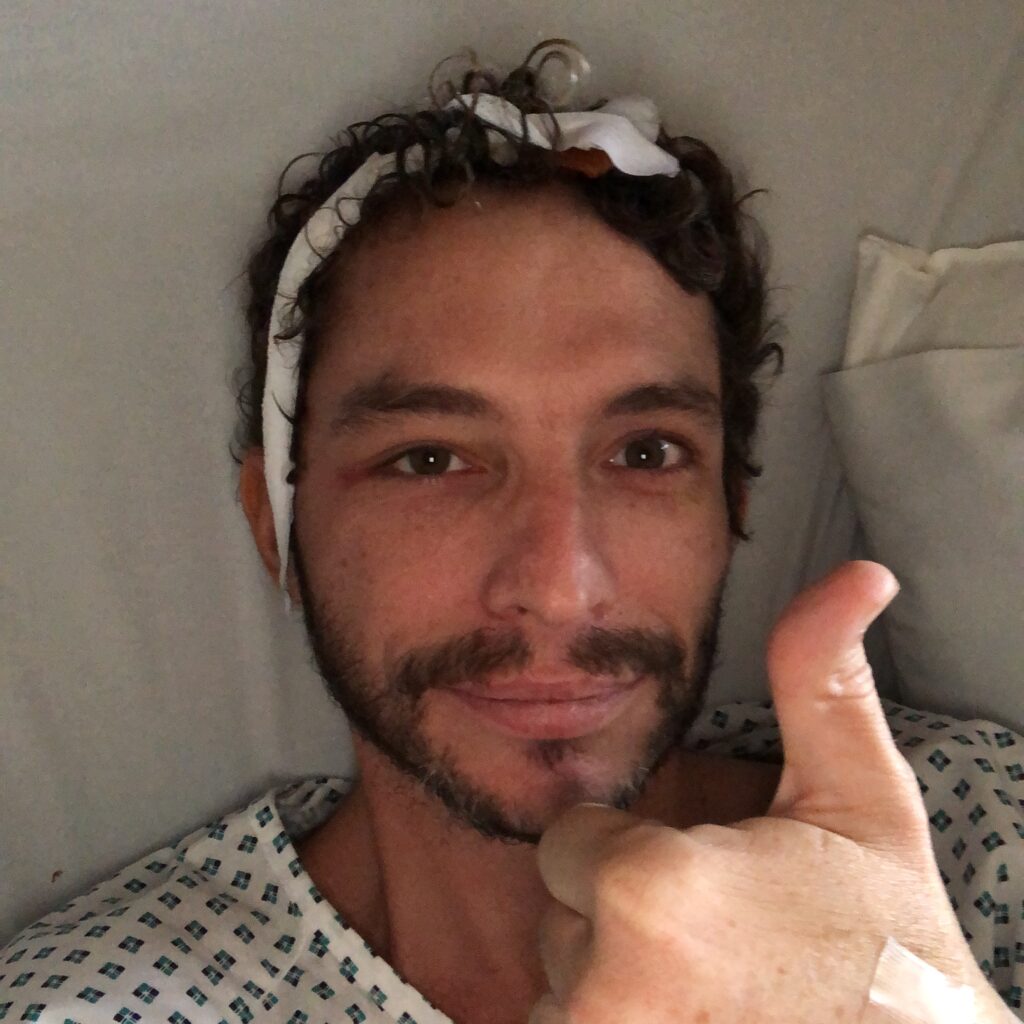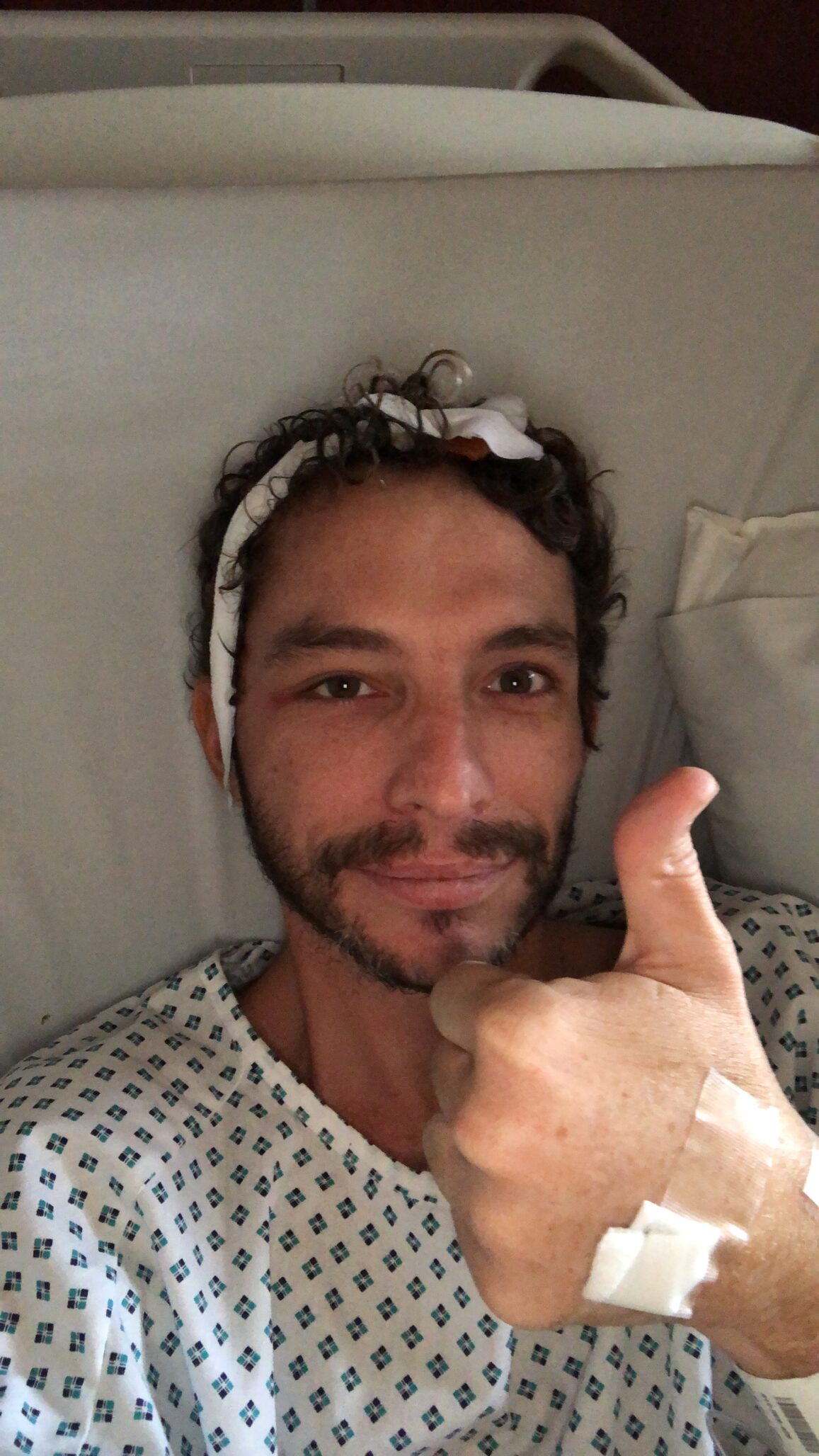Michael’s Story

During my recovery running has been my best friend, it has been my mirror, it has been a life saver for me.
Michael Amore

Michael Amore, 39, was diagnosed with a suprasellar brain tumour in November 2021, having first noticed strange symptoms in March 2019. Michael said:
“When I was younger, I often had migraines and seizures. I never really worked out what caused them, because there were different triggers. But in the beginning of 2019, I remember visiting the hospital to say that I had this strange sensation – that “something was beating on my brain like a drum and pumping a nervous chemical around my body”. During that time, I started to always feel on edge, continuously sweating, and having headaches. I was diagnosed as having anxiety and given medication for it. The medication sort of just took the edge off me and helped me to get through the days.”
At this time, Michael was a Psychology student at University in Dubai, and leading a very active life. As a sports coach, he taught scuba diving, took people hiking, and trained people in the gym. He was also working with sports brand ASICS as their Frontrunner Community Manager for the Middle East, a role he really enjoyed:
“Being team captain for the Middle East team was a huge opportunity for me. It was all about running, being inclusive, and sharing inspirational stories between ourselves and our social media audiences. I think Dubai, where I was stationed, has one of the most diverse running communities in the world. Everyday there is something happening there. It was an incredible experience”.
So Michael was keeping busy and managing his odd symptoms. Nothing could have prepared him for his admission to hospital in November 2021, when his tumour was discovered. He had successful surgery in January 2022 in Dubai, but four months into his recovery, made the decision to move back to England to help his rehabilitation, leaving his old life behind. He was able to enroll in Bournemouth University, but the transition was still a huge shock. Michael said:
“I pretty much found myself living a completely new life. From my life in Dubai, to my new life in England, everything has changed.
“Before my diagnosis I was living a very active life and making the most of every minute. These days I still try to make the most of every minute, but I definitely don’t feel the same as I used to.
“I miss everything about my old life. I am not who I used to be, and I have to accept that and be optimistic about who I am now.”
How Running Helped
Unable to resume many of his former activities, including his beloved scuba diving, Michael found that running – taking it very carefully at first – offered many benefits.
For the first run since his surgery, he set himself the target of running a loop to finish at a local gym. Completing that first run was emotional, because he wasn’t sure he would make it. Michael said:
“Once I arrived at the gym, I didn’t know whether to laugh or cry. I was so emotional. I told the gym reception that “I made it”. They were a little confused. So, I explained to them what I had been through and that I didn’t know if I was going to make this run. It was a funny moment for me.
“During my recovery running has been my best friend, it has been my mirror, it has been a life saver for me. And even though I still struggle with running at the moment, mainly due to my head, I know that running is only trying to get me through this recovery. That is why I try my best to run every day and encourage others to run. Running can be that helping hand to everyone.”
Michael is so convinced of the power of running that he is currently in the process of setting up a running club at his university. He said:
“Running is probably the most inclusive and diverse sport in the world.
“At the moment, the club is still in its beginning stages. But the idea will be that everyone is welcome. Race, ethnicity, gender, age, it doesn’t matter. It’s like being on the dancefloor with your friends. Only this dancefloor creates a more positive and healthier environment for you!”
Preparing to take on The Bournemouth Bay Run
On April 2nd, Michael will tackle his first race since his diagnosis and treatment – the Bournemouth Bay Run – when he will tackle the half marathon distance. It promises to be a big challenge, and he expects it to be an emotional occasion:
“I am nervous about it, because I will be running with the weight of a brain surgery and my recovery.
“Before my diagnosis and surgery I had my whole life planned out. I had built some roots and been really happy with the direction I was going. After my surgery, everything changed. I lost my job, my friends, my apartment, my car, I even had to start university at the beginning again. Running has helped me to deal with all that.
“When I reach the finish line, I imagine I will probably be in tears. With the other runs I’ve done, when I finish, I usually breakdown for a few moments as I let out all the struggles I am going through.
“Completing the Bournemouth Bay Run will be another step on my recovery journey and I’m really looking forward to it.”
